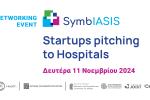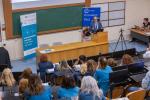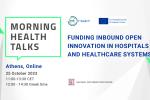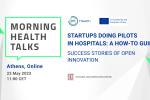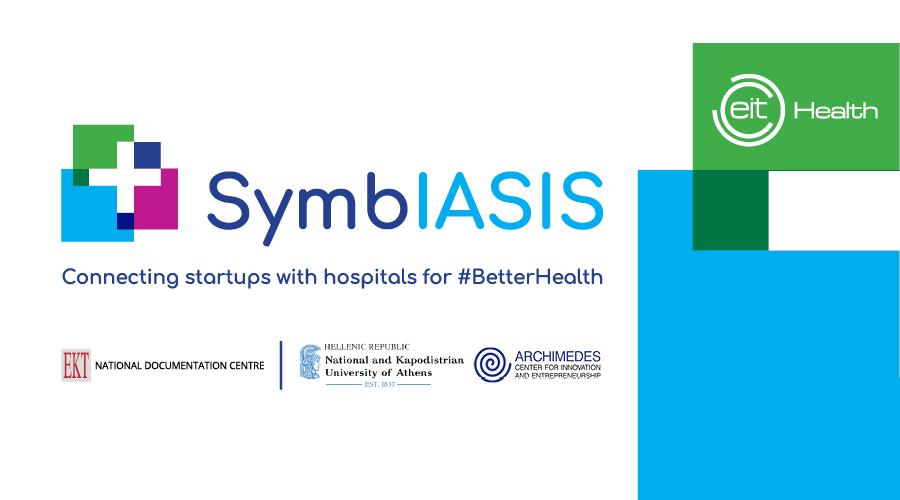
17 partnerships between hospitals and startups were developed thanks to the SymbIASIS project implemented within the framework of EIT Health by the National Documentation Centre (EKT), in collaboration with the Archimedes Innovation and Entrepreneurship Centre of National and Kapodistrian University of Athens (NKUA).
The aim of SymbIASIS (=Symbiosis + Iasis) is to enhance the dialogue between hospitals and start-ups active in the health sector, to exchange knowledge and experience, to network and explore collaborations in order to develop innovative products and services.
The hospitals/clinics participating in the programme from the outset are as follows:
- 1st ENT Department Ippokrateio Hospital NKUA,
- Vascular Surgery Clinic of NKUA, General University Hospital ‘Attikon’
- 2nd Department of Cardiology NKUA, General University Hospital ‘Attikon’
- 3rd Department of Surgical Clinic NKUA, General University Hospital ‘Attikon’
- General Hospital of Thessaloniki Papageorgiou
- Hygeia Hospital
- Onassis Cardiac Surgery Centre
While the following hospitals/clinics participated from a later date:
- Oncology Clinic, 401 General Military Hospital of Athens
- Athens Medical Group
- Oncology Clinic, General University Hospital ‘Attikon’
- 4th Department of Internal Medicine, General University Hospital ‘Attikon’
A major success of the pioneering programme by Greek standards is that in just one year it attracted 11 hospitals and clinics and 40 of the most dynamic start-ups operating in the health sector.
The most important indicator of SymbIASIS' success is the conclusion of 17 start-up partnerships with clinics and hospitals. Of these, four concern new pilot projects within hospitals, four are new business partnerships, and the rest are collaborations for participation in European funding programmes or competitions.
The initial expectation was for the first year of the project to start the dialogue and the development of the skills of start-ups and ambassadors in order to increase their readiness for the creation of pilot projects (e.g. training on IP/CE/MDR/Procurement) and the start of 4 pre-pilot projects.
However, SymbIASIS far exceeded the initial targets and established itself as the first accelerator for healthcare start-ups in Greece.
How we worked
"Our model was some of the few corresponding international projects such as the ARC from the Sheba Hospital in Israel," says George Megas, coordinator of the EIT Health Hub at EKT.
The project team made an exhaustive record of the needs of the ‘market’, the maturity of the proposals and the existing innovative technological solutions. Then, the process of connecting businesses with hospitals and clinics began.
Networking, information and co-creation workshops were organised. Each clinic and hospital appointed ambassadors from the medical or administrative staff to be responsible for liaising with the startups. These acted as gateways for start-ups to hospitals.
In this way, startups gained access to real environments to mature themselves and the technological solutions they had developed.
An example of a successful collaboration that emerged through the SymbIASIS programme, is the interconnection of the company Shuttle Catheters / Athroa with the vascular surgery clinic of the General University Hospital ‘Attikon’. An internationally renowned vascular surgeon from Attikon participated in the advisory board and contributed to the improvement of the business model, which according to the company itself eventually led, among other things, to winning the first place in the pan-European EIT Health Innostars Awards competition!
New momentum for 2023
In 2023, SymbIASIS will continue, intensifying its activities. Soon, a new round of proposals for the participation of startups and hospitals in the programme will open.
At the same time, a collaboration will be launched with the first Greek patient hub that will provide patient to expert advice for those who need a specialised approach and information to develop innovative products and services that will be of real benefit to the community.
At the same time, even more ambassadors from existing and new partner hospitals will be activated, and more specialised networking and information events will be organised.
Finally, funding schemes will be sought to ensure the sustainability of pilot projects in hospitals in an effort to overcome the obstacle of financing startup services in the first pilot years of trial operation of their technology.
Contact
For more information, please contact George Megas, EIT Health Hub Coordinator (megas@ekt. gr), Varvara Vasilaki, EIT Health project manager (vasilaki@ekt. gr).
About EIT Health
The National Documentation Centre (EKT) is the EIT Health hub in Greece and coordinator of the pioneering SymbIASIS project.
EIT Health is one of the largest European networks for health innovation. It consists of 280 partners including leading companies, universities, research and development centres, hospitals and institutes. Its role is to build an ecosystem that enables the future development of healthcare, offering European citizens better health and longevity. EIT Health upgrades the skills of healthcare professionals by investing in Europe's best talent and facilitates the commercialisation of innovative products/solutions within the EU. It is supported by the European Institute of Innovation and Technology (EIT), a body of the European Union. For more information, please visit: www. eithealth. eu.








